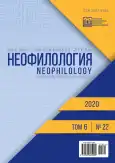English phraseological units as a mean of representing knowledge of a person’s physical characteristics
- Authors: Dolgova E.V.1
-
Affiliations:
- Derzhavin Tambov State University
- Issue: Vol 6, No 22 (2020)
- Pages: 308-317
- Section: ЯЗЫКОЗНАНИЕ
- URL: https://journal-vniispk.ru/2587-6953/article/view/302767
- DOI: https://doi.org/10.20310/2587-6953-2020-6-22-308-317
- EDN: https://elibrary.ru/KFQIQH
- ID: 302767
Cite item
Full Text
Abstract
We center on the study of the phraseological units semantics from cognitive positions. In particular, attention is paid to information about person physical characteristics represented by phraseological units of the English language containing somatisms, as well as the names of food, clothing and furniture. As phraseological units representing information about physical characteristics we consider those units which represent information about the properties of the body and/or appearance of the human body. The aim of the study is to identify semantic features of these phraseological units, as well as to consider the cognitive mechanisms of their development. During the study of the given phraseological units semantics, the following semantic groups are distinguished: 1) the structure of the human body; 2) age; 3) appearance; 4) the physical/physiological characteristics of the person. In the course of studying the factual material, it is established that the main mechanisms for the development of the meaning of the studied phraseological units are cognitive metaphor, metonymy and metaphtonymy. It is concluded that when comprehending human physical properties, a reference is made both to the very conceptual field of HUMAN and to other conceptual fields involved in the processes of reinterpretation. These may include the conceptual fields FOOD, CLOTHING, FURNITURE, PLANT, ANIMAL.
Keywords
About the authors
E. V. Dolgova
Derzhavin Tambov State University
Author for correspondence.
Email: lenochka5dol@yandex.ru
ORCID iD: 0000-0002-1561-0659
Post-Graduate Student, Foreign Philology and Applied Linguistics Department
33 Internatsionalnaya St., Tambov 392000, Russian FederationReferences
- Babina L.V., Dzyuba K.A. Kognitivno-matrichnyy analiz pri izuchenii naimenovaniy torgovykh marok (na pri-mere parfyumernykh torgovykh marok) [Cognitive-matrix analysis in the study of brand names (for example, perfume brands)]. Vestnik Tomskogo gosudarstvennogo universiteta. Filologiya – Tomsk State University Jour-nal of Philology, 2013, no. 5 (25), pp. 5-11. (In Russian).
- Gutovskaya M.S. Aktual’nyye problemy kognitivnoy frazeologii [Current problems of cognitive phraseology]. In: Nizhneva N.N. (executive ed.). Yazyki mira – v mir yazykov: Vyp. 6 [Languages of the World – Into the World of Languages: Issue 6]. Minsk, Belarusian State University Publ., 2015, pp. 75-82. (In Russian).
- Boldyrev N.N. Interpretiruyushchaya funktsiya yazyka [Language interpretation function]. Vestnik ChelGU – Bulletin of Chelyabinsk State University, 2011, no. 33. pp. 11-16. (In Russian).
- Boldyrev N.N. Rol’ interpretiruyushchey funktsii v formirovanii yazykovykh kategoriy [The role of the interpre-tive function in the formation of language categories]. Vestnik Tambovskogo universiteta. Seriya: Gumanitar-nyye nauki – Tambov University Review. Series: Humanities, 2011, no. 1 (93), pp. 9-16. (In Russian).
- Boldyrev N.N. Rol’ kognitivnogo konteksta v interpretatsii mira i znaniy o mire [The role of cognitive context in the interpretation of the world and knowledge of the world]. Vestnik Chelyabinskogo gosudarstvennogo universiteta. Filologiya. Iskusstvovedeniye – Bulletin of Chelyabinsk State University. Philology. Arts, 2014, no. 6 (335), issue 88, pp. 118-122. (In Russian).
- Galich T.S. K opredeleniyu ponyatiya kognitivnogo mekhanizma [To the definition of the concept of a cog-nitive mechanism]. Materialy 8 Mezhdunarodnoy nauchnoy konferentsii «Slovo, vyskazyvaniye, tekst v kog-nitivnom, pragmaticheskom i kul’turologicheskom aspektakh» [Proceedings of the 8th International Scientific Conference “Word, Utterance, Text in Cognitive, Pragmatic and Cultural Aspect”]. Chelyabinsk, 2016, vol. 2, pp. 205-208. (In Russian).
- Maslova Z.N., Popova E.A. Problema razgranicheniya kognitivnykh protsessov, mekhanizmov, operatsiy [The problem of distinguishing between cognitive processes, mechanisms, operations]. Materialy dokladov 7 Mezh-dunarodnoy konferentsii «Inostrannyye yazyki v kontekste mezhkul’turnoy kommunikatsii» [Proceedings of the 7th International Conference “Foreign Languages in the Context of Intercultural Communication”]. Saratov, Publ. Center “Nauka”, 2015, pp. 80-84. (In Russian).
- Gulland D.M., Hinds-Howell D. The Penguin Dictionary of English Idioms. Second edition. London, Penguin Books Publ., 1994, 305 p.
Supplementary files









